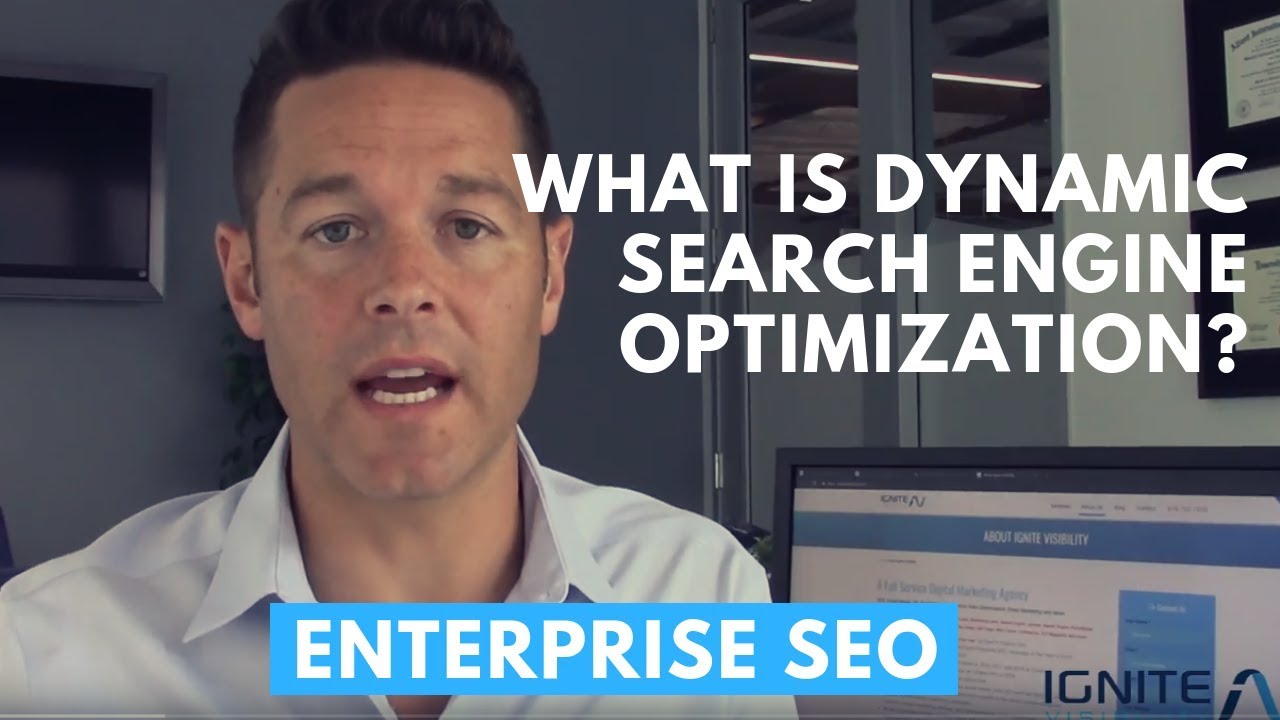In today's digital age, enterprises need to have a strong online presence to remain competitive. One of the most effective ways to achieve this is through search engine optimization(SEO). In this article, we'll explore some of the top enterprise SEO trendsthat businesses need to know to improve their online visibility and drive more traffic and leads.
SEOinvolves optimizing a website and its contentto rank higher in search engineresults pages (SERPs) for relevant keywords. As SEObest practices continue to evolve, it's important for enterprises to stay up-to-date with the latest trends and techniques.
What Is Enterprise SEO?

Enterprise SEO: What Is Dynamic Search Engine Optimization?
Enterprise SEO is a specialized type of search engine optimization that focuses on optimizing large-scale websites for search engines. It involves implementing strategies to improve a website's rankings in search engine results pages (SERPs) and increase online visibility, reach, and profitability for large businesses and organizations. Enterprise SEO typically requires a more comprehensive approach to SEO, which may include technical SEO, content marketing, local SEO, and other advanced strategies.
Why Is Enterprise SEO Important?
Enterprise SEO is important for large businesses and organizations because it helps improve their online visibility and reach, which can drive more traffic and leads to their website. With the majority of consumers using search engines to find products and services online, ranking higher in search engine results pages (SERPs) is crucial for businesses to remain competitive
By implementing effective enterprise SEO strategies, businesses can increase their visibility in search results, improve brand awareness, and ultimately increase revenue and profitability. Additionally, enterprise SEO helps businesses stay on top of the latest search engine algorithm updates and other industry trends, which can help them maintain their competitive edge.
Enterprise SEO Trends
Voice Search Optimization

How Voice Search Optimization Works | 5 Voice Search SEO Tips
With the increasing popularity of voice-enabled devices like Amazon Alexa, Google Home, and Apple HomePod, voice search optimization has become a crucial aspect of enterprise SEO. Here are some key considerations for optimizing your enterprise website for voice search:
- Focus on Long-Tail Keywords- Voice search queriestend to be longer and more conversational than text-based searches. Therefore, it's important to focus on long-tail keywords that are more likely to match the way people speak. Use natural language and include questions and phrases that people are likely to use in voice searches.
- Optimize for Featured Snippets - Voice-enabled devices often pull information from featured snippets (also known as "position zero" results) when answering voice search queries. To increase your chances of appearing in featured snippets, make sure your content is well-structured, easy to read, and provides concise answers to common questions related to your industry.
- Make Sure Your Website is Mobile-Friendly- Most voice searches are conducted on mobile devices, so it's important to ensure that your enterprise website is optimized for mobile. This includes using responsive design, optimizing page speed, and providing a seamless user experienceacross all devices.
- Leverage Local SEO- Voice searches are more likely to be location-based, so optimizing for local search is crucial for enterprise businesses. Make sure your businessis listed on local directories like Google My Businessand Yelp, and include location-specific keywords in your content and metadata.
Local SEO
For enterprise businesses with physical locations, local SEO is a critical component of their overall SEO strategy. Here are some key trends and considerations for optimizing your enterprise website for local search:
- Google My Business Optimization- Google My Business (GMB) is a free tool that allows businesses to manage their online presence on Google, including search and maps. Optimizing your GMB listing can help improve your local search visibility and drive more traffic to your website. Be sure to include accurate and up-to-date information about your business, such as your address, phone number, and hours of operation.
- Customer Reviews- Customer reviews play a key role in local SEO, as they help establish trust and credibility with potential customers. Encourage customers to leave reviews on your GMB listing, and respond promptly to any negative reviews to show that you value customer feedback and are committed to providing a positive customer experience.
- Local Content Creation- Creating high-quality, locally-focused content can help improve your local search rankings and attract more local customers to your business. Consider creating blog posts, videos, and other content that highlight local events, landmarks, and businesses, and include location-specific keywords in your content and metadata.
- Mobile Optimization- Most local searches are conducted on mobile devices, so it's important to ensure that your enterprise website is optimized for mobile. This includes using responsive design, optimizing page speed, and providing a seamless user experience across all devices.
Mobile-First Indexing

Mobile-First Indexing
With mobile devices accounting for the majority of internet traffic, mobile-first indexing has become a top priority for enterprise businesses. Here are some key considerations for optimizing your enterprise website for mobile-first indexing:
- Responsive Design- Responsive design is essential for mobile-first indexing, as it allows your website to adapt to different screen sizes and devices. Make sure your website is designed with mobile users in mind, with a clear and intuitive interface that is easy to navigate on a smaller screen.
- Page Speed- Page speed is a critical factor for both user experience and search engine rankings. Slow-loading pages can lead to higher bounce rates and lower search rankings, particularly on mobile devices. Optimize your website's loading speed by compressing images, minimizing code, and leveraging caching and content delivery networks (CDNs).
- Structured Data- Structured data helps search engines better understand the content on your website and can improve your visibility in search results. Use schema markupto provide structured data for key elements like business information, product reviews, and events.
- AMP- Accelerated Mobile Pages (AMP) is an open-source framework that allows websites to create fast-loading mobile pages that are optimized for search engines. Consider implementing AMP on key pages of your website, such as your blog or product pages.
User Experience (UX) Optimization
User experience (UX) has become a critical factor in enterprise SEO, as search engines increasingly prioritize websites that provide a seamless and engaging user experience. Here are some key trends and considerations for optimizing your enterprise website for UX:
- Mobile Optimization- As discussed in the previous section on mobile-first indexing, mobile optimization is essential for providing a positive user experience. Make sure your website is optimized for mobile devices, with a responsive design, fast page speed, and an intuitive interface that is easy to navigate on a smaller screen.
- Page Layout and Design- The layout and design of your website can have a significant impact on user engagement and conversion rates. Consider using clear and concise headlines, engaging visuals, and a logical layout that guides users through the content.
- Accessibility- Accessibility is an important consideration for enterprise businesses, as it allows users with disabilities to access and navigate your website. Ensure that your website is designed with accessibility in mind, with features like alt tags for images, clear and concise language, and keyboard navigation.
- Personalization- Personalization is becoming increasingly important in enterprise SEO, as it allows businesses to tailor their website content and user experience to individual users. Consider using personalization tools like dynamic content, targeted landing pages, and customized messaging based on user behavior and preferences.
Artificial Intelligence (AI) And Machine Learning
Artificial intelligence (AI) and machine learning are rapidly transforming the field of enterprise SEO, enabling businesses to gain new insights, automate processes, and improve their search rankings. Here are some key trends and considerations for leveraging AI and machine learning in your enterprise SEO strategy:
- Natural Language Processing (NLP)- Natural language processing (NLP) is a branch of AI that enables machines to understand and interpret human language. NLP can be used to analyze search queries and website content, enabling businesses to better understand user intentand optimize their website accordingly.
- Content Creation- AI-powered content creation tools are becoming increasingly popular, as they allow businesses to generate high-quality content at scale. Consider using tools like GPT-3 or other natural language generation (NLG) tools to create blog posts, product descriptions, and other types of content that are optimized for search engines and engage users.
- Personalization and Recommendation Engines- Personalization and recommendation engines use machine learning algorithms to deliver personalized content and recommendations to individual users. These tools can be used to deliver targeted content and product recommendations based on user behavior and preferences, improving engagement and conversion rates.
- Automated Analytics and Reporting- AI-powered analytics and reporting tools can help businesses automate the process of data analysis and reporting, freeing up valuable time and resources for other SEO activities. Consider using tools like Google Analyticsor other AI-powered analytics platforms to track website performance and identify areas for improvement.
Content Marketing

What is Content Marketing?
Content marketing has become a critical component of enterprise SEO, as businesses strive to create high-quality, engaging content that attracts and engages users. Here are some key trends and considerations for leveraging content marketing in your enterprise SEO strategy:
- Topic Clusters and Pillar Pages- Topic clusters and pillar pages are a content marketing strategy that involves creating a group of related blog posts and pages, with a pillar page that serves as the main hub. This approach can help businesses organize their content around key topics, improve search rankings, and provide a better user experience.
- Video Content- Video content is becoming increasingly popular in content marketing, as it allows businesses to engage users with visual and interactive content. Consider creating video content that is optimized for search engines, with clear and concise messaging, engaging visuals, and a call to action that encourages users to take action.
- Interactive Content- Interactive content, such as quizzes, polls, and interactive infographics, can be a highly effective way to engage users and drive conversions. Consider incorporating interactive content into your content marketing strategy, with a focus on creating content that is both informative and engaging.
- Thought Leadershipand Expertise- Establishing thought leadershipand expertise in your industry can be a highly effective content marketing strategy, as it helps to build trust and credibility with users. Consider creating content that showcases your expertise, such as whitepapers, case studies, and industry reports.
Technical SEO
Technical SEOinvolves optimizing the technical aspects of your website to improve search rankings and user experience. Here are some key trends and considerations for leveraging technical SEO in your enterprise SEO strategy:
- Core Web Vitals- Core Web Vitals are a set of user-focused metrics that Google uses to measure the user experience on a website. These metrics include loading speed, interactivity, and visual stability. Optimizing for Core Web Vitals can improve search rankings and user experience, and is becoming increasingly important for enterprise SEO.
- Schema Markup- Schema markup is a type of structured data that provides additional context to search engines about the content on your website. This can help to improve search rankings and user experience, as it makes it easier for search engines to understand the content on your website.
- Mobile Optimization- With more and more users accessing the internet on mobile devices, mobile optimization has become a critical component of technical SEO. Consider optimizing your website for mobile devices, with a focus on improving loading speed, usability, and mobile-friendliness.
- Site Architecture- Site architecture refers to the way that your website is structured, including the organization of pages, categories, and navigation. Optimizing site architecture can improve search rankings and user experience, as it makes it easier for users to find the content they are looking for.
People Also Ask
How Does Enterprise SEO Differ From Traditional SEO?
Enterprise SEO differs from traditional SEO in several ways, including the scale of the website being optimized, the complexity of the site's architecture, and the level of competition for relevant keywords. Enterprise SEO also involves a more comprehensive approach to SEO, which may include technical SEO, content marketing, local SEO, and other advanced strategies.
What Are Some Common Enterprise SEO Challenges?
Some common enterprise SEO challenges include dealing with complex website architectures, managing large amounts of content, implementing effective keyword strategies, and ensuring website security and compliance. Other challenges may include keeping up with changing search engine algorithms and balancing SEO efforts with other marketing and business priorities.
How Can Businesses Measure The Success Of Their Enterprise SEO Efforts?
Businesses can measure the success of their enterprise SEO efforts by tracking metrics such as website traffic, keyword rankings, click-through rates, conversion rates, and revenue generated from organic searches. They can also use tools like Google Analytics and other SEO software to monitor and analyze their website's performance and make data-driven decisions to improve their SEO strategy.
Conclusion
SEO is an essential aspect of digital marketing for enterprises, and keeping up with the latest trends and techniques is crucial for success. From voice search optimization to local SEO, mobile-first indexing, user experience, and artificial intelligence, there are many factors to consider when developing an effective enterprise SEO strategy.
By staying on top of these enterprise SEO trends and incorporating them into their digital marketing efforts, businesses can improve their online visibility, reach, and profitability.